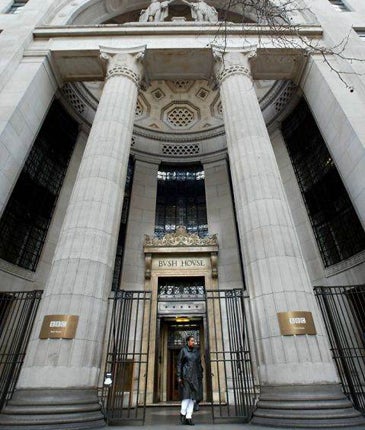BBC considers leaving iconic London sites in bid to save cash

BBC figures from Chris Moyles to the director general Mark Thompson could be removed from their offices under BBC plans to save money through a "radical" reduction of the buildings it owns in London.
The corporation's chief operating officer Caroline Thomson said yesterday she had ordered a 30 per cent reduction in the amount of building space which the BBC occupies. "It's about looking quite radically at London and where we have property there," she said.
It means that the BBC will look carefully at whether to move out of satellite buildings such as Yalding House, the home of Radio 1 since 1996, and the daily workplace of Moyles, Fearne Cotton and Tim Westwood. Western House, the home of Radio 2 and 6 Music, may also be targeted, although the building has only recently been refurbished with new studios.
Ms Thomson said: "We are looking in [London] W1 around Broadcasting House where we still have a number of ancillary properties. Can we exit those and put everyone into Broadcasting House?" Other ancillary BBC buildings in central London include Bush House, the home of the BBC World Service, Henry Wood House and Brock House.
She also said that the BBC was considering abandoning the White City building in west London, which it opened in 1990 and which houses the offices of the director general. "We are going to look at [whether] we can get out of more property in W12," she said. "Could we get out of the White City building?"
Along with Television Centre, White City forms part of the BBC's historic base in Shepherd's Bush, west London. No final decisions will be taken on which buildings will be abandoned until the BBC concludes its Delivering Quality First review at the end of the summer.
Ms Thomson, who said the BBC needed to prioritise programme-making over "bricks and mortar", was adamant that the reduction of 170,000sq m of property space in the next four years would not have an impact on the corporation's presence in the nations and regions. "It's not about exiting any British regions or Scotland, Wales or Northern Ireland or any of the local radio stations."
The comments were an indication of the BBC's commitment to making an increasing amount of its programming outside of London. Ms Thomson did not rule out an entire channel moving to the Media City complex in Salford, which is to be home to several BBC departments. "We have a [team] looking at how we spread production around the UK."
Ms Thomson said that, in a further attempt at improving the efficiency of the BBC, the corporation would be stripping out tiers of management so that there would be seven layers of organisation from director-general to the most junior members of staff.
She said £1m had been found for investment in technological upgrades in regional television. "It's a mistake to think of Delivering Quality First as about just saving money," she said. "It's also about how you restructure and change the culture of the BBC."
Subscribe to Independent Premium to bookmark this article
Want to bookmark your favourite articles and stories to read or reference later? Start your Independent Premium subscription today.

Join our commenting forum
Join thought-provoking conversations, follow other Independent readers and see their replies